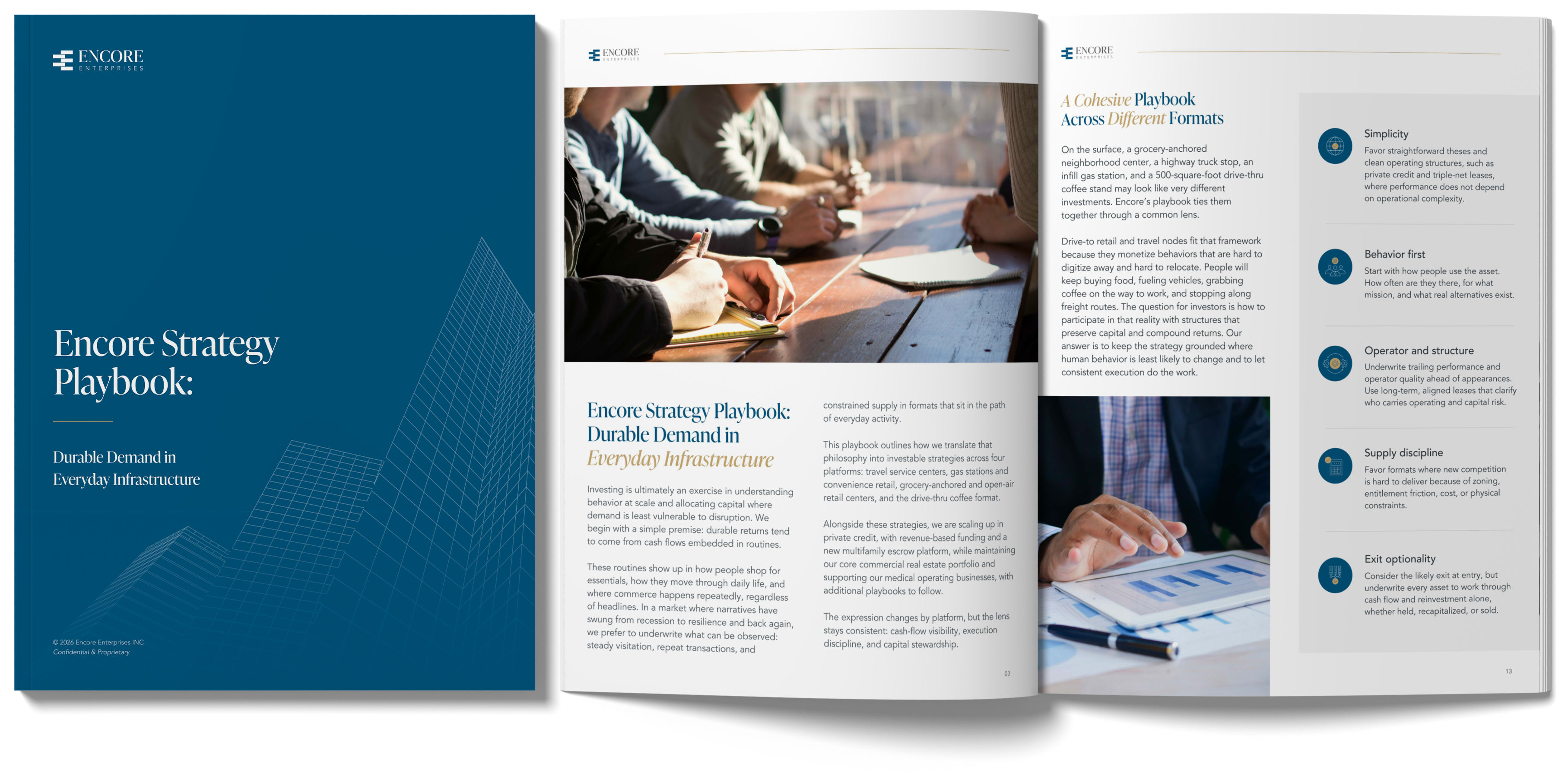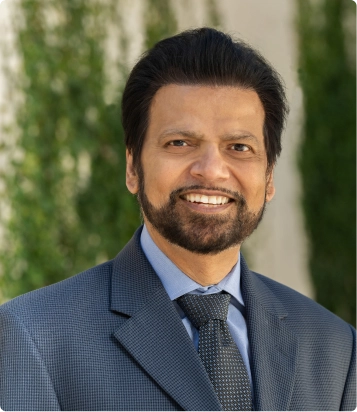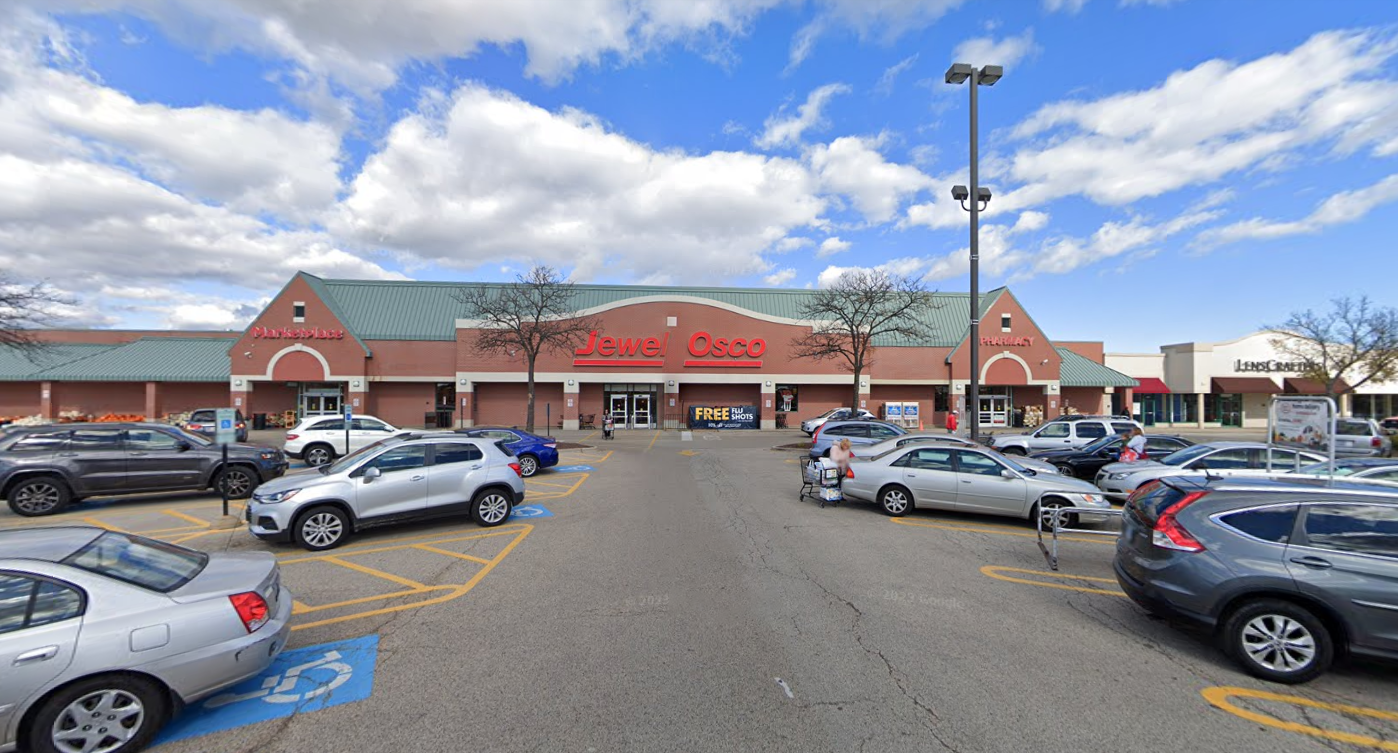Investing is ultimately an exercise in understanding behavior at scale and allocating capital where demand is least vulnerable to disruption. We begin with a simple premise: durable returns tend to come from cash flows embedded in routines.
These routines show up in how people show for essentials, how they move through daily life, and where commerce happens repeatedly, regardless of headlines. In a market where narratives have swung from recession to resilience and back again, we prefer to underwrite what can be observed: steady visitation, repeat transactions, and constrained supply in formats that sit in the path of everyday activity.
This playbook outlines how we translate that philosophy into investable strategies across four platforms: travel service centers, gas stations and convenience retail, grocery-anchored and open-air retail centers, and the drive-thru coffee format.
Alongside these strategies, we are scaling up in private credit, with revenue-based funding and a new multifamily escrow platform, while maintaining our core commercial real estate portfolio and supporting our medical operating businesses, with additional playbooks to follow.
The expression changes by platform, but the lens stays consistent: cash-flow visibility, execution discipline, and capital stewardship.
Encore Investment Framework
This framework is built around durable demand and underwriting realism rather than narrative appeal. Encore deploys capital from a position of operating maturity, with a strategy designed to generate meaningful growth without relying on aggressive expansion or accepting modest, yield-driven outcomes.
We focus on assets and operating platforms where value creation is driven by repeatable economic activity and disciplined execution. Growth is derived from operating performance, capital efficiency, and pricing discipline, not from long-duration capital defensiveness or speculative scale.
Accordingly, we are intentionally positioned closer to the core end of the risk spectrum than in prior opportunistic periods. We are not pursuing hyper-growth strategies that depend on aggressive leverage, rapid expansion, or perfect macro conditions. At the same time, we are not allocating capital to low-volatility assets designed primarily to preserve value over decades.
Cash-on-cash performance is a gating requirement, and capital is allocated where current income and forward growth are both supported by the underlying business. Our objective is to generate durable, risk-adjusted growth that compounds through execution. Three principles govern the approach:
- Operational reality over conventional optics. Our strategy is not to chase AAA real estate for its own sake. We respect the durability of prime locations, but we underwrite the return profile, not the headline. Even “Main and Main” can produce thin yields if the business underneath underperforms. We prioritize lease structure and operator execution, and we focus on formats where value creation is driven by measurable performance, not assumptions.
- Supply discipline as a return driver. In retail, our bias is toward formats where new supply is structurally constrained and value creation is driven by leasing execution, not redevelopment risk. This is reinforced by observed rent resets in supply-constrained markets.
- Return-driver diversification, not asset labels. We construct the strategy to balance yield, rent growth, and operating upside without depending on a single macro outcome, a single operator, or a single exit window.
Strategy Implementation by Asset Type
Our investment framework is expressed through a set of four strategies designed to capture durable demand in different ways. Each platform serves a distinct role, balancing current income, growth potential, tax efficiency, and liquidity, while remaining anchored to the same underwriting discipline.
Travel service centers and truck stops reflect an emphasis on cash flow visibility and scale-driven economics. Operating at the intersection of real estate and enterprise operations, performance is shaped less by traditional location metrics and more by operator execution, throughput, and long-term lease structure.
These assets routinely serve hundreds of trucks per day—often 300 to 500 or more—under national fleet fueling agreements that generate materially higher diesel margins, frequently approaching $0.50 per gallon. Revenue is diversified across fuel, food, retail, and driver services, while federal driving-hour regulations and contract-based fueling relationships create predictable stopping behavior.
Underwriting Snapshot
- Long-duration master triple-net leases (≈20-year initial terms)
- Underwritten to trailing diesel volumes and operator execution
- Fleet contracts and regulated stopping behavior support demand
- Operator quality prioritized over real estate optics
We participate through master lease structures that shift operating responsibility to experienced and best-in-class operators and tenants and guarantee rent regardless of sub-tenant performance, reinforcing income durability. Individual assets commonly trade in the $35–$40 million range and are positioned for exit through portfolio-level transactions rather than individual asset sales. The result is a yield-oriented platform designed to produce stable income with limited capital volatility, supported by typical hold periods of three to five years and targeted dispositions while approximately 15 years of lease term remain to preserve downstream buyer demand.
Gas stations and convenience stores apply similar principles in a more distributed form. Profitability is driven by repetition and convenience, with inside-the-store sales accounting for the majority of economic value rather than fuel margins, which are often thin on a per-gallon basis. In a market that is highly fragmented, many stores are still owned by small operators, creating opportunities to buy well-located assets that never reach institutional deal flow. We focus on existing locations with demonstrated operating history, typically secured under true triple net leases with 20 year initial terms, where tenants are responsible for taxes, insurance, maintenance, and capital expenditures.
Underwriting Snapshot
- Existing locations only with verifiable sales history
- Profit driven by inside-the-store sales, not fuel margins
- Preference for infill sites with barriers to new competition
- Typical 3–5 year hold, exiting with meaningful lease term remaining
These structures shift operational and capital risk away from ownership while creating high visibility into cash flow. Assets are frequently located in infill or overlooked neighborhoods where competition is constrained by physical or zoning limitations and where the store functions as a de facto grocery and retail outlet for the surrounding community. Value creation is pragmatic rather than transformational. It comes from a sourcing and execution edge: local partners who uncover motivated sellers, paired with proven regional operators who can standardize performance. We then drive outcomes through operator alignment, modest refinements, lease stabilization, and disciplined leverage, generally targeting approximately 65% loan-to-value on larger assets to support double-digit cash-on-cash returns. Exits are typically oriented toward individual asset sales, where remaining lease term, predictable income, and tax efficiency support durable buyer demand.
Grocery-anchored and open-air retail centers serve as the portfolio’s stabilizing force. These assets benefit from necessity-based demand and consistent visitation, supported by a structural supply environment that has favored landlords as new retail construction has remained historically constrained. This approach emphasizes well-located centers anchored by grocery stores or other essential tenants with strong renewal probability, where leasing execution and rent growth—rather than redevelopment risk—drive returns over time.
Underwriting prioritizes immediate cash yield and tenant durability, with recent acquisitions and renewals achieving material rent increases as legacy leases roll, in some cases moving rents from the high teens into the low 30s per square foot or higher.
Underwriting Snapshot
- Strong necessity-based anchors driving consistent traffic
- Immediate cash yield required; marquee brands alone are insufficient
- Value creation via leasing execution and rent resets
- Focus on markets with limited new retail supply
Capital discipline remains central; we have passed on large, high-quality grocery-anchored portfolios when projected returns fell below target thresholds, typically around 10% cash-on-cash, even when anchored by premier national brands. This approach ensures that brand quality enhances returns rather than substitutes for them. Grocery-anchored assets provide flexibility and optionality, allowing properties to be held for stable income, selectively recapitalized, or monetized as leasing objectives are achieved and liquidity presents itself.
The 7 Brew drive-thru coffee platform represents a more growth-oriented extension of the same framework, combining operating execution with disciplined real estate selection. The model is intentionally simple at the unit level—each stand operates from an approximately 500-square-foot prefabricated building with no food preparation, minimal equipment, and a double drive-thru format engineered for speed and throughput. National average unit volumes of roughly $2.4–$2.5 million materially exceed traditional fast-casual benchmarks and reflect a business built around habitual purchasing rather than discretionary dining.
Underwriting Snapshot
- Minimum traffic and trade-area transaction density thresholds
- High-retail-density corridors; weekend traffic matters
- Clustered site strategy to reinforce convenience and repeat visits
- Permitting and development timelines explicitly underwritten
Success in this strategy depends on precision: high-traffic trade areas, strong retail adjacency, and efficient permitting and development timelines. We underwrite 7 Brew as a habit-based business, deliberately clustering locations within a two-mile radius to reinforce repeat behavior and capture demand embedded in daily commuter patterns.
Site selection emphasizes retail performance over rooftops alone, with target criteria including daily traffic counts of approximately 20,000 vehicles or more—often exceeding 50,000 at high-performing locations—household incomes at or above market averages, and placement within trade areas generating at least five million annual transactions and approximately $150 million in retail sales within roughly two miles. Co-tenancy with overperforming grocery stores, Costco or Walmart, and high-volume QSRs serves as a proxy for traffic quality.
While operationally more involved than our lease-driven strategies, the underlying thesis remains consistent: durable consumer behavior, limited supply of high-quality sites, repeatable unit-level economics, and a defined path to scale. New stores are underwritten with a two- to three-year ramp to stabilization, with the long-term objective of assembling a 25–30 unit portfolio capable of producing exit outcomes comparable to much larger legacy restaurant portfolios, transacting at double-digit EBITDA multiples.
These platforms reflect our belief that durability is not confined to a single format. By applying a consistent lens across varied expressions of real assets and operating businesses, we are able to diversify return drivers while maintaining a cohesive approach to risk, execution, and long-term capital stewardship.
Market & Macro Backdrop: Conditions That Reward Selectivity
Entering 2026, the environment is shifting from pure constraint to selective opportunity. The Federal Reserve’s December 2025 implementation note set the federal funds target range at 3.50%–3.75%, reflecting a move toward easier policy after the higher-rate period of 2024–2025.[i] For real assets, the significance is not “rates will save the day,” but that price discovery and deal velocity can improve when financing becomes incrementally more workable.
At the same time, the consumer has remained more stable than sentiment would suggest. The U.S. Census Bureau’s advance report put October 2025 retail and food services sales at $732.6B, up 3.5% year-over-year, suggesting continued baseline demand even with mixed headlines.[ii]
For retail real estate specifically, the setup remains defined by tight fundamentals and limited new supply. Costar reported a 4.3% national retail vacancy rate at year’s end, underscoring stability even amid closures and bankruptcies and highlighting under-construction volume that has fallen to its lowest level since 2021.[iii] These conditions tend to favor owners who can execute leasing and push rents in well-located centers—exactly where Encore concentrates.
Liquidity is also improving. Altus Group reported $150.6B of U.S. CRE transaction value in Q3 2025, up 23.7% quarter-over-quarter and 25.1% year-over-year—an important signal that the market is moving again, though not uniformly.[iv] In practice, that means the gap between “financeable, underwriteable cash flow” and “speculative story” is widening, rewarding disciplined strategies with visible income and clear execution plans.
A final tailwind is tax policy. Multiple third-party summaries of the 2025 tax law, commonly referred to as the “One Big Beautiful Bill Act,” note that 100% bonus depreciation was restored and made permanent for qualifying property, such as gas stations, placed in service after January 19, 2025.[v] For operator-heavy real assets, this can meaningfully affect after-tax cash flow—but Encore treats it as a secondary enhancer, not the core thesis.
Encore’s Moves Over the Past 12 Months
Across these verticals, we have used the past year to sharpen the link between strategy and behavior:
Travel nodes. In December 2025, we acquired four truck stops as a single portfolio, with an aggregate value of approximately $130 million dollars. The decision was to gain meaningful enterprise exposure through a master-tenant model, instead of slowly accumulating dozens of smaller convenience store assets. In parallel, we acquired five convenience stores in the back half of 2025, with an aggregate value of approximately eleven million dollars. These locations were chosen for trailing performance, operator quality, clear value-add paths, and, in many cases, operator guarantees that further secure rent streams.
Essential retail. In May 2025, we acquired grocery-anchored retail centers in Chicago and Rhode Island, growing the entire commercial portfolio to 26 properties totaling approximately 1.41 million square feet. Across the portfolio, several key assets moved from construction-heavy phases into strong leasing environments, with tenants outperforming sales expectations on the back of heavy foot traffic. Against this backdrop, we passed on the previously mentioned $160 million national grocery portfolio, despite its premier anchors, reinforcing that return thresholds, typically around 10% cash-on-cash, remain firm.
7 Brew. On the development side, we treated 2025 as a year to prove the operating model and refine the pipeline. Four stands came online in Utah, with eight more scheduled for 2026, working toward a development agreement target of 28 total stands by the end of 2027. The team used real timeline experience to justify the decision to bring entitlement and permitting capabilities closer to the core of the platform and to divest our Arizona development rights.
Taken together, these moves illustrate the broader pattern. Capital goes where behavior is durable, where supply is naturally constrained, and where we have the operational insight to underwrite both the current income and the exit.
A Cohesive Playbook Across Different Formats
On the surface, a grocery-anchored neighborhood center, a highway truck stop, an infill gas station, and a 500-square-foot drive-thru coffee stand may look like very different investments. Encore’s playbook ties them together through a common lens.
- Simplicity. Favor straightforward theses and clean operating structures, such as private credit and triple-net leases, where performance does not depend on operational complexity.
- Behavior first. Start with how people use the asset: how often they show up, for what mission, and what real substitutes exist.
- Operator and structure. Underwrite trailing performance and operator quality ahead of appearances. Use long-term, aligned leases that clearly allocate operating and capital risk.
- Supply discipline. Favor formats where new competition is hard to deliver because of zoning, entitlement friction, cost, or physical constraints.
- Exit optionality. Consider the likely exit at entry, but underwrite every asset to work through cash flow and reinvestment alone, whether held, recapitalized, or sold.
Drive-to retail and travel nodes fit that framework because they monetize behaviors that are hard to digitize away and hard to relocate. People will keep buying food, fueling vehicles, grabbing coffee on the way to work, and stopping along freight routes. The question for investors is how to participate in that reality with structures that preserve capital and compound returns. Our answer is to keep the strategy grounded where human behavior is least likely to change and to let consistent execution do the work.
[i] Federal Reserve. Implementation Note. Issued December 10, 2025. https://www.federalreserve.gov/newsevents/pressreleases/monetary20251210a1.htm.
[ii] U.S. Census Bureau, Economic Indicators Division, Retail Indicator Branch. Advance Monthly Sales for Retail and Food Services, October 2025. Published December 16, 2025. https://www2.census.gov/retail/releases/historical/marts/adv2510.pdf.
[iii] CoStar. United States Retail National Report. Published January 9, 2026
[iv] Bassett, J. Altus Group Releases Q3 2025 U.S. Investment & Transactions Quarterly Report. Altus Group. https://www.altusgroup.com/press-releases/altus-group-releases-q3-2025-us-investment-transactions-quarterly-report/.
[v] Grant Thornton. OBBBA Offers New Ways to Accelerate Depreciation. Published August 4, 2025. https://www.grantthornton.com/insights/alerts/tax/2025/insights/obbba-offers-new-ways-to-accelerate-depreciation.

 For the past several years, operating hotels has required resilience, discipline, and an unusual level of patience. Owners have navigated shutdowns, labor shortages, inflation, supply-chain disruption, rising insurance costs and higher interest rates – often simultaneously. But as welcome as further rate cuts may be, it is important to separate relief from resolution. Lower borrowing costs will not fix the structural pressures now shaping the hospitality sector.
For the past several years, operating hotels has required resilience, discipline, and an unusual level of patience. Owners have navigated shutdowns, labor shortages, inflation, supply-chain disruption, rising insurance costs and higher interest rates – often simultaneously. But as welcome as further rate cuts may be, it is important to separate relief from resolution. Lower borrowing costs will not fix the structural pressures now shaping the hospitality sector.